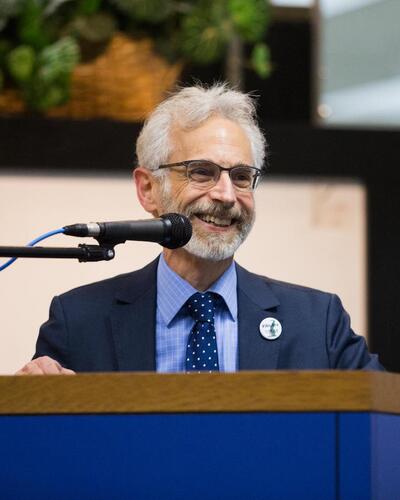Paul Schacht received his Ph.D. from Stanford University and became a member of the Geneseo faculty in 1985. He teaches courses in Victorian literature and Digital Humanities.
Schacht is director of Geneseo's Center for Digital Learning and is principal author of the CDL's open access resource Critical Digital Practices. He is also director of Digital Thoreau, a collaboration among Geneseo, the Thoreau Society and the Walden Woods Project to promote scholarly and public engagement with the works of American transcendentalist writer Henry David Thoreau. Schacht has received two Chancellor’s Awards for Excellence, one in teaching and the other in faculty service.
In 2016-17, Schacht served as Interim Provost and Vice President for Academic Affairs at Geneseo.
Schacht coordinates the English department's annual Walter Harding Lecture, which has featured speakers such as Robin Wall Kimmerer, Bill McKibben, William Cronon, Laura Dassow Walls, and Pier Gabrielle Foreman.
To meet for advisement or find out more about any of the above, don't hesitate to book an appointment.

Curriculum Vitae
Publications
"In Pursuit of Pickwick's Hat: Dickens and the Epistemology of Utilitarianism," Dickens Studies Annual. 40 (2009)
"Rowing Alone: Technology and Democracy in the Humanities Classroom," International Journal of Technology, Knowledge, and Society, 4 (2008), 61-68.
"The Collaborative Writing Project," in Using Wiki in Education, ed. Stewart L. Mader
More About Me
Websites
Office hours by appointment. Why not book one?
Awards
- Chancellor's Award for Excellence in Teaching, 1997
- Chancellor's Award for Excellence in Faculty Service, 2007
Classes
-
ENGL 340: Lit & Lit Study in Digital Age
Digital technology is transforming the way we produce, distribute, and study literature. Under the umbrella term "digital humanities," scholars are building electronic archives that put literary texts in historical, biographical, geographical, and other contexts; using computational tools to analyze and visualize the form and content of texts; creating new platforms for scholarly communication about texts; and trying to understand the larger cultural impact of the digital revolution. This course undertakes a close examination of all these developments while also introducing students to basic tools for digital communication, preservation, and textual analysis. Prerequisite: ENGL 203
